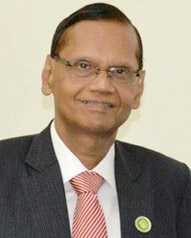Supreme Court judgment binding in every sense - Prof. G.L. Peiris
 Prof. G.L. Peiris, Minister of External Affairs, has pointed out that
the legal effect of a determination by the Supreme Court under Article
129 (1) of the Constitution is a settled matter, in view of a conclusive
ruling by the Supreme Court. Prof. G.L. Peiris, Minister of External Affairs, has pointed out that
the legal effect of a determination by the Supreme Court under Article
129 (1) of the Constitution is a settled matter, in view of a conclusive
ruling by the Supreme Court.
Article 129 (1) provides that: “If at any time it appears to the
President of the Republic that a question of law or fact has arisen or
is likely to arise which is of such nature and of such public importance
that it is expedient to obtain the opinion of the Supreme Court upon it,
he may refer that question to that Court for consideration and the Court
may, after such hearing as it thinks fit, within the period specified in
such reference or within such time as may be extended by the President,
report to the President its opinion thereon”.
Article 129(3) declares “Such opinion, determination and report shall
be expressed after consideration by at least five Judges of the Supreme
Court, of whom, unless he otherwise directs, the Chief Justice shall be
one”.
In the case of Bandaranaike v. Attorney-General (1982 SLR Vol 2,
p.786) a Bench of three Judges of the Supreme Court, in S.C.
Application No. 104/82, declared categorically, at p. 792 that in the
scheme of the relevant chapter of the Constitution, the “determination”
referred to in some Articles (Articles 121, 122, 123, 125 and 126), the
“judgment” envisaged in others (Article 127), and “opinion” referred to
in Article 129(1) (the Article under which the Presidential Reference in
the present case was made), are all made by the Supreme Court in the
exercise of its several jurisdictions. Sharvananda J. (with the support
of Wanasundara J. and Victor Perera J) stated in explicit terms that
“the descriptions ‘ determinations’, ‘judgment’, ‘opinion’, ‘decision’
and ‘conclusion’ are different labels for the same concept”.
It is entirely clear, on the basis of this pronouncement that the
opinion of the Supreme Court, given under Article 129 (1) of the
Constitution, has exactly the same authority as a judgment handed down
by the Court in litigation between parties. There is no difference
whatsoever in terms of degree of authority. The reality is that the
jurisdiction of the Supreme Court is invoked, and can be exercised, in a
variety of ways, original, appellate, revisionary and in fundamental
rights applications, and in terms of Article 129(1).
The degree of authority cannot be differentiated, depending on the
nature of the jurisdiction.
There are many judgments of the Supreme Court stating that the
decision of a Bench of three Judges, for instance, cannot validity be
overturned by a Bench of five Judges: in either case, the decision is
not that of the individual Judges but that of the Supreme Court, and is
binding, as such.
Words such as “opinion” or “determination” can make no difference, as
pointed out by the Supreme Court in Bandaranaike v. Attorney-General .
It has been the practice from British times for a Full Bench to be
constituted to consider, and pronounce on, matters of great importance.
In the current instance, there is a unanimous ruling by ten Judges of
the Supreme Court. It is a judgment of the Supreme Court, and is
binding, in every sense. |

